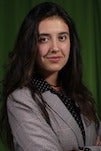- Tatiana Pardo Ibarra, a freelance journalist in Bogotá, Colombia and an alumna of Metcalf's2020 Annual Workshop for Journalists, strives to give voice to those who often go unheard.
Biography
Tatiana Pardo Ibarra, a freelance journalist in Bogotá, Colombia, strives to give voice to those who often go unheard.
“The best way to get scientific issues onto the agenda is when you relate these topics to human rights experiences,” states Pardo Ibarra, an alumna of Metcalf Institute’s 2020 Science Immersion Workshop for Journalists. She connects environmental and scientific topics with various human rights issues through her reporting, including issues of gender and racial equality, climate justice, and environmental challenges impacting Indigenous peoples. “If we listen to different voices and perspectives, we can better understand these issues in a more holistic and interdisciplinary way, and come up with mitigation and adaptation strategies that are more effective and equitable,” she says.
Pardo Ibarra has witnessed conflicts and their aftermaths. While she was working at El Espectador, the oldest newspaper in Colombia, the country signed a peace agreement with the Revolutionary Armed Forces of Columbia (FARC), a Marxist guerrilla group that battled the government for more than 50 years. Although the agreement ushered in many benefits including an end to the war, Pardo says there were also unforeseen environmental consequences. “It’s not all that simple. One of the paradoxes we are seeing at the moment is that, just as the war has had a negative impact on the environment with mining and drug trafficking, it is also clear that it allowed the conservation of vast territories that were closed off for decades not only to the State, but also to industrial projects, road infrastructure, large human settlements and the entry of scientists or an overwhelming tourism,” says Pardo.
“During the war, some regions, especially the Amazon, were left alone due to fear of the rebel group,” says Pardo. “There was no tourism or investment from international corporations.” The sudden departure of the armed rebel group from forests left natural resources more accessible and vulnerable, leaving room for international industries and illegal logging to exploit the resource-rich ecosystems of Latin America.
Pardo Ibarra learned that during the five decades that FARC inhabited the area, the rebel group formed a close relationship with nature. “It was interesting trying to grasp the empirical knowledge that the rebel group had of the ecosystem and the paradoxes that exist between nature and violence,” says Pardo Ibarra, who was also the only environmental reporter at Columbia’s largest daily newspaper, EL Tiempo. “This taught me the importance of listening to both sides of a postconflict scenario and considering different perspectives instead of going with preconceived notions.”
Pardo Ibarra has begun to dig deeper into violence against environmental leaders and defenders in Latin America and the Caribbean as editorial coordinator for Land of Resistants, a coalition of Latin American Journalists who report on this type of violence.
“Defending the mountains, forests, and jungles of Latin America has never been as dangerous as it is now,” she explains. “There have been more than 2,300 known violent events against these people in the last 11 years, and we are sure that there are more stories to be documented and made visible.” Indigenous groups are the most vulnerable to these attacks, according to Pardo, especially since they often speak out against environmental destruction and tend to live in remote areas. “They are attacked in their own land, says Pardo, adding that the attacks continue even as the victims quarantine from the COVID-19 pandemic. “We want to publicize these cases and show everyone that the victims are not just numbers. These victims are real people with stories and important battles.”
Pardo says she was pleased to see Metcalf Institute integrate social and environmental justice issues in connection with climate change during the Annual Workshop. “It was amazing to hear all the different diverse voices and perspectives over the two weeks,” she says. “I appreciated hearing from colleagues, scientists, and having international viewpoints and an equal number of men and women.” She says it was clear that Metcalf sought to feature diversity in all forms, which enhanced her experience. “We didn’t just talk about technical and scientific topics, but also our shared human experiences surrounding these ideas,” says Pardo. “This is similar to what I aim to do through my work. Scientific papers are not enough if they are not grounded in the everyday life we live”
Looking toward the future, Pardo is in the process of applying for graduate school, with several applications and interviews underway in a few different regions of the world including the United Kingdom and the United States. She plans to earn a Master’s degree in climate science /or environmental management and policy so that she can continue to show the human side of science through her stories.
Written by Gabriella Placido. She’s in her second year of a URI College of the Environment and Life Sciences (CELS) Communication Fellowship. The Fellowship was established in 2014 to help graduate students gain hands-on science communication experience by interviewing, gathering content for stories, and writing for the CELS website, social media, and newsletter.

